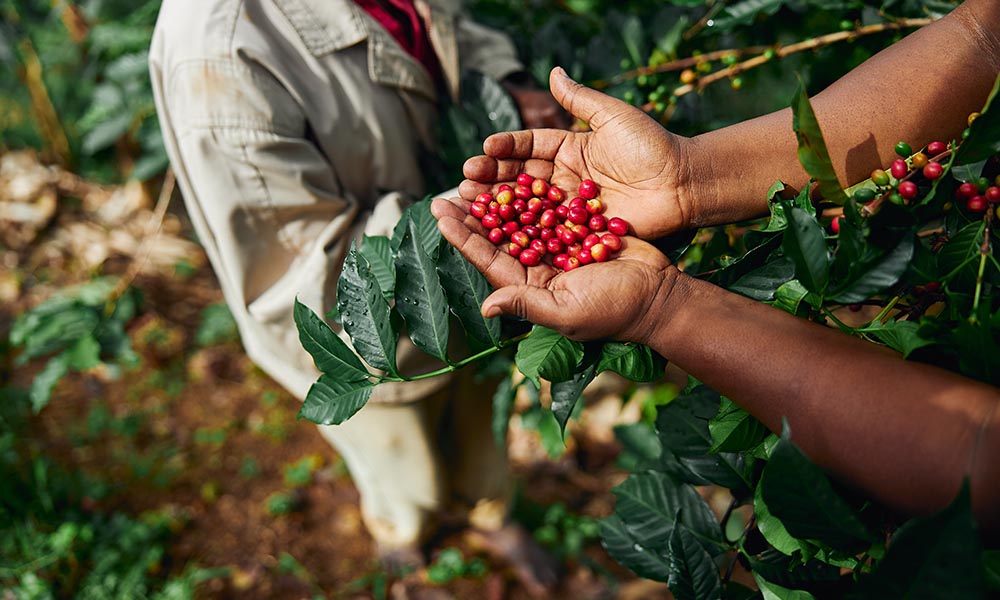
Colombia
La Colmena


The question “who invented coffee?” doesn’t have a straightforward answer, as its discovery was the result of a long process of diffusion and transformation across several continents. However, we can still trace the key historical moments that led to the birth and spread of this iconic drink. What made coffee the most loved and widely consumed beverage in the world? Where did it originate, and what is its story? Its beginnings are interwoven with myths, legends, and genuine historical events. While today we enjoy it as part of our daily routine, the origins of coffee remain a subject of study and debate.
The first legend linked to the discovery of coffee has its roots in Ethiopia, where, according to local folklore, a goatherd named Kaldi stumbled upon the stimulating effects of coffee around the 9th century. The story goes that Kaldi noticed his goats became particularly lively after eating the berries from a certain plant, so he decided to try them himself. Following this discovery, a monk from a nearby monastery began preparing a drink from these berries, which helped him stay awake during long hours of night-time prayer. Legend has it that the monk shared the recipe with his fellow brethren, thereby giving rise to what we now know as coffee. The confirmed origins of coffee are indeed located in the region of Kaffa, Ethiopia, from where it spread far and wide. Thanks to these origins, today we can enjoy the finest blends of coffee. Its evolution over time has given us the chance to appreciate everything from grind-your-own coffee beans to refined single-origin varieties.

The true expansion of coffee as a beverage took place in the Arab world between the 15th and 16th centuries. During this time, Saudi Arabia and the Ottoman Empire played a pivotal role in popularising coffee throughout the Middle East. It was in the southern part of the Arabian Peninsula, present-day Yemen, that coffee was first cultivated on a large scale. The Sufi monks, who used coffee to stay awake during prayer, were likely the first to prepare the drink in a form similar to how we know it today.
From the 15th century onwards, coffee began being served in homes and mosques in cities like Mecca and Medina, where the first “qahveh khaneh” (coffee houses) were established—gathering places that became important cultural and social hubs. Coffee then spread throughout the Ottoman Empire and eventually reached Venice around 1600, brought in by traders and Venetian diplomats.
Coffee arrived in Europe in the 17th century, primarily due to commercial ties with the East. The first European coffee house opened in Venice in 1645, but it was in London where the phenomenon truly took off. In 1652, the first English coffee house opened, quickly becoming a hotspot for political, cultural, and scientific debate. London coffee houses were even dubbed “penny universities” for their role in encouraging intellectual discussion and the exchange of ideas. Coffee continued to make its way into other major European cities, such as Paris, where sipping coffee became an essential part of urban culture during the reign of Louis XV.
With the expansion of European trade routes in the 18th century, coffee began to be cultivated in plantation form across various tropical regions, including Brazil, the Caribbean islands, and Southeast Asia. Coffee trade, driven by colonial companies, became a cornerstone of imperialist economies. The plant was soon being grown on a vast scale in countries like Brazil, Colombia, and Vietnam. Coffee became one of the most significant commodities in global trade, giving rise to an entire industry encompassing cultivation, roasting, distribution, and consumption.
It’s impossible to credit a single individual with the invention of coffee, as its history is the outcome of centuries of experimentation and innovation. From Kaldi the goatherd’s legend in Ethiopia, to its spread through the Islamic world, to its arrival in Europe and the birth of the first coffee houses, coffee has journeyed across continents, evolving into a symbol of conviviality, social interaction, and cultural exchange. Today, with more than two billion cups consumed daily around the globe, coffee remains a beverage that unites millions, carrying with it ancient roots and fascinating stories that continue to inspire new generations.